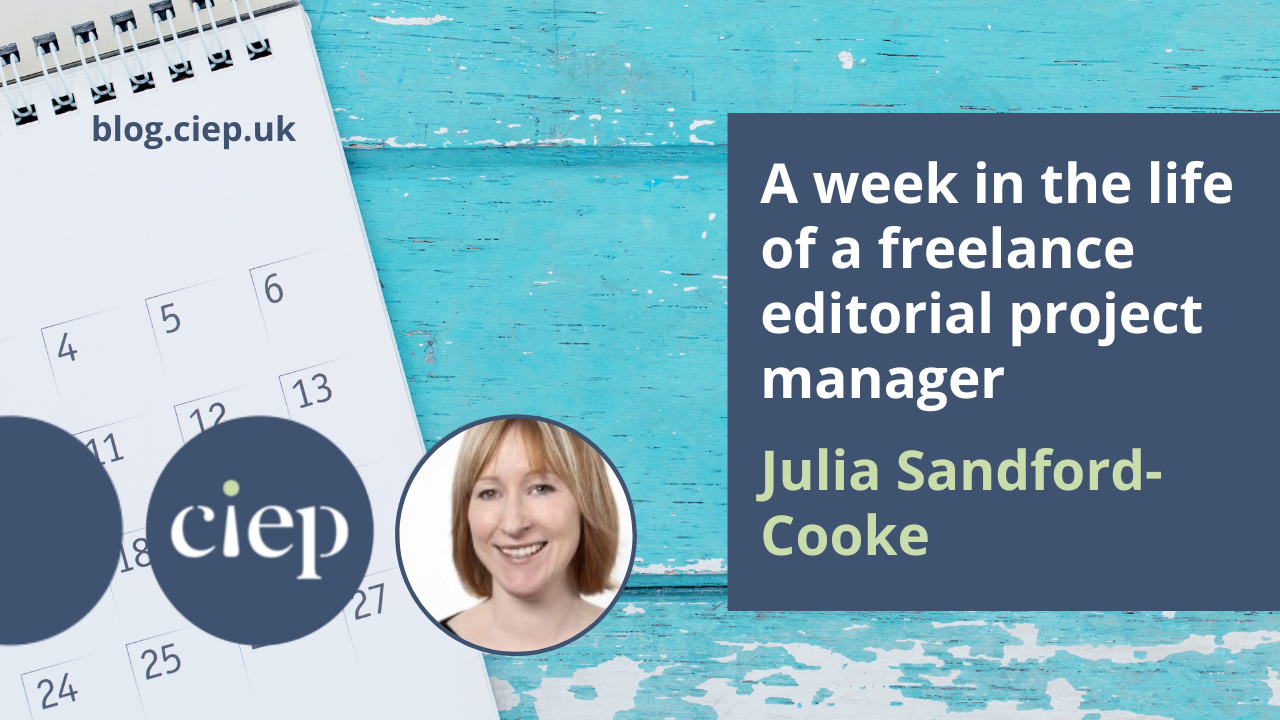What does editorial project management actually involve and where do copyeditors and proofreaders fit into the process? In this post, Julia Sandford-Cooke describes some of the typical tasks she undertakes as a freelance editorial project manager working on educational projects.
The week begins with a review of my To Do list and a check of schedules because To Do lists and schedules are at the core of editorial project management. I’m currently an editorial project manager (EPM) on two large educational projects and I spend a lot of time checking, updating, ticking off and fretting about dates. These days, the scheduling software Smartsheet defines the work of the whole team; some projects have five or six separate schedules for different components, all feeding into each other, dates turning red if one of those components begins to run late.
In fact, if you run your own editorial business you’ll already have skills in getting tasks done on time and within budget for external clients.
I’m drawing attention to this straight away because newer editors sometimes feel that they lack the experience to take on a project management role, that they don’t have the right qualifications or enough in-depth knowledge of how publishing works. But, looking back at my early days as an editorial assistant at an educational publisher, I realise that I’ve been a project manager for most of my career – certainly before I began to define myself as a hands-on ‘editorial professional’. If you’re able to organise, schedule and write polite emails, you’re halfway there – in-house experience isn’t necessary, although admittedly it can make finding project management work easier, not least because of the network of contacts you’ll have built.
What does an EPM do?
So what do I do in a typical week? Well, it depends on the project – I work in educational publishing and a teacher resource is quite different to an online lesson or a printed textbook – but, in general, an EPM is expected to:
- maintain schedules
- keep track of spending, including maintaining budget records and raising purchase orders for freelance work
- commission freelancers, such as copyeditors, proofreaders, fact-checkers and indexers
- communicate with typesetters or digital teams and make sure they follow the brief and stick to the schedules
- keep the client informed of progress, via emails and meetings (yes, an EPM does have to be prepared to attend and contribute to weekly or fortnightly video meetings)
- collate proof comments from the project team – it’s not uncommon to bring together and streamline corrections and queries from the publisher’s content manager, designer and commissioning editor, the awarding body (if the resource is being endorsed), the proofreader, the author, the fact-checker and an internal peer checker, all within a single PDF proof.
I have to fit all this in among other, smaller, editing and proofreading jobs for other clients – yes, back to scheduling again!
Who do EPMs work for?
Most EPMs either work directly with a publisher or – more often these days – work for a ‘packager’ or publishing agency that is contracted with the publisher and completes the projects using a mixture of their own employees and freelancers like me. Examples of UK-based educational publishing agencies (who, incidentally, all have friendly and supportive staff) are Haremi, Just Content and Newgen.
EPMs may be given a company email address while they work on their projects, which I have to admit goes against my sense of being a self-employed person with my own brand identity. However, it does reinforce a feeling of teamwork with colleagues on the project – whether in-house or freelance – and means that people you contact know which business you are representing.
Typical task: commissioning and briefing freelancers
Which brings me to today’s pressing task. I need to commission a proofreader to start next week. As a freelancer myself, I know that ideally jobs should be arranged a few weeks in advance but, of course, the unexpected often happens – projects run late, someone gets Covid – so unfortunately I’m finding it a challenge to identify someone suitable at short notice. I prefer to use an editorial professional who I know will do a good job, who I’ve worked with before or who is recommended by a colleague. When I was looking for an indexer, a team member said, ‘Use this person – she’s awesome!’ And indeed she was. That’s the sort of recommendation project managers look for, and that gets freelancers repeat work.
In this case, the proofreader also has to fulfil certain criteria. They must:
- have access to, and have previously used, the client publisher’s online systems. Getting set up is a long and complicated business, even before you are confronted with what could be a new and bewildering interface, and time is not on our side.
- be on the packager’s freelance database. This means they’ve (probably) passed the editorial test, signed a confidentiality agreement and been added to the finance systems so that a purchase order can be raised and they can invoice.
I only contact one person at a time – it’s probably not the most efficient way of working but I don’t want to ask several people and then have to let them down in the admittedly unlikely event of them all being available for the job. It’s made me realise, with my freelance editor hat (tiara?) on, that EPMs value a quick response, whether it’s yes or no, so that they can keep their project moving.
I have adapted the brief to meet the needs of this resource and contact three potential proofreaders. The first is too busy, the second will be on holiday and the third is going on maternity leave. I make a cup of coffee and collate some proofs while I consider who to contact next.
Typical task: collating proofs
This is one of my favourite jobs, especially now it’s done on PDF on my screen and not on a desk covered in reams of A3 pages from five different sources. It’s where my editorial skills come in handy, as I assess all the comments, take out duplications and make a judgement on which corrections to ask the typesetter to make. As I work through, I compile a query log where, for example, the fact-checker has raised author queries or where the designer and the content manager of the publisher have suggested different solutions to overmatter. I upload the PDF and query log to their online system and let the content manager know it’s ready for her to check. She is very efficient so I know she will consider it carefully and get back to me with any questions.
Typical task: checking a digital project
Now I need to check that corrections have been made to my other project, a digital resource, so I log out of one system and log into another. This type of resource is new territory for the whole team so there’s been a constant stream of online messages as colleagues ask for advice. Digital projects will become more common as publishers innovate to meet the needs of the market (in this case, blending remote and classroom learning), and publishing agencies often put out requests for people with skills and experience in digital publishing and associated platforms. Freelancers who have worked on this project and others like it – whether over the longer term as EPMs, or on specific tasks such as proofreading – will be in demand for similar jobs in the future.
Editorial project management can be tiring, frustrating and stressful. On the other hand, it’s exciting and satisfying to see a project through, to watch it develop and to help shape it to be as good as it can be for the market and for the client. If you like a challenge – and what editorial professional doesn’t? – and, of course, if you thrive on schedules and To Do lists, it’s definitely worth considering. Check out the CIEP’s Editorial Project Management course if you want to learn more.
About Julia-Sandford Cooke
Julia Sandford-Cooke of WordFire Communications has 20 years’ experience of publishing and marketing. She has written and edited numerous textbooks, specialising in vocational education, media studies, construction, health and safety, and travel.
 About the CIEP
About the CIEP
The Chartered Institute of Editing and Proofreading (CIEP) is a non-profit body promoting excellence in English language editing. We set and demonstrate editorial standards, and we are a community, training hub and support network for editorial professionals – the people who work to make text accurate, clear and fit for purpose.
Find out more about:
Photo credits: calendar by rattanakun on Canva, laptop by Jessica Lewis Creative on Pexels.
Posted by Harriet Power, CIEP information commissioning editor.
The views expressed here do not necessarily reflect those of the CIEP.


